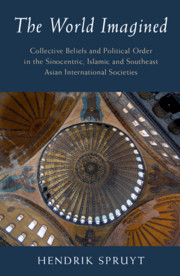 The World Imagined
The World Imagined Book contents
- The World Imagined
- LSE International Studies
- The World Imagined
- Copyright page
- Dedication
- Contents
- Figures
- Preface
- Acknowledgments
- A Note on Transliteration
- 1 Introduction
- Part I Beyond the Westphalian Gaze
- 2 The Historical–Sociological Approach to Understanding Order in International Systems
- 3 Collective Beliefs and Visions of Order
- Part II The East Asian Sino-centric Order
- Part III The Islamic Cultural–Historical Community
- Part IV Collective Imagination among the Polities of Southeast Asia
- Bibliography
- Index
3 - Collective Beliefs and Visions of Order
from Part I - Beyond the Westphalian Gaze
Published online by Cambridge University Press: 18 June 2020
- The World Imagined
- LSE International Studies
- The World Imagined
- Copyright page
- Dedication
- Contents
- Figures
- Preface
- Acknowledgments
- A Note on Transliteration
- 1 Introduction
- Part I Beyond the Westphalian Gaze
- 2 The Historical–Sociological Approach to Understanding Order in International Systems
- 3 Collective Beliefs and Visions of Order
- Part II The East Asian Sino-centric Order
- Part III The Islamic Cultural–Historical Community
- Part IV Collective Imagination among the Polities of Southeast Asia
- Bibliography
- Index
Summary
This chapter defines international societies as a set of polities that share foundational collective beliefs—a collective imagination regarding the nature and purposes of political and social organization. It discusses two challenges to ahistorical, positivist social science and international relations scholarship. Constructivist theory has convincingly demonstrated how international systems are social systems and that ideas and interests are inextricably linked. Similarly, the English School has championed the need for historical analyses and contextual nuance. This chapter acknowledges the affinity as well as differences between these approaches and my analysis. Furthermore, it articulates a methodology to conduct contextual, interpretative, and empirical analysis. Such an analysis demonstrates that political communities and international order do not depend solely or even primarily on material capabilities. In order to understand how political communities and order are constituted, one must acknowledge the importance of the ceremonial and the symbolic.
Keywords
- Type
- Chapter
- Information
- The World ImaginedCollective Beliefs and Political Order in the Sinocentric, Islamic and Southeast Asian International Societies, pp. 34 - 80Publisher: Cambridge University PressPrint publication year: 2020
